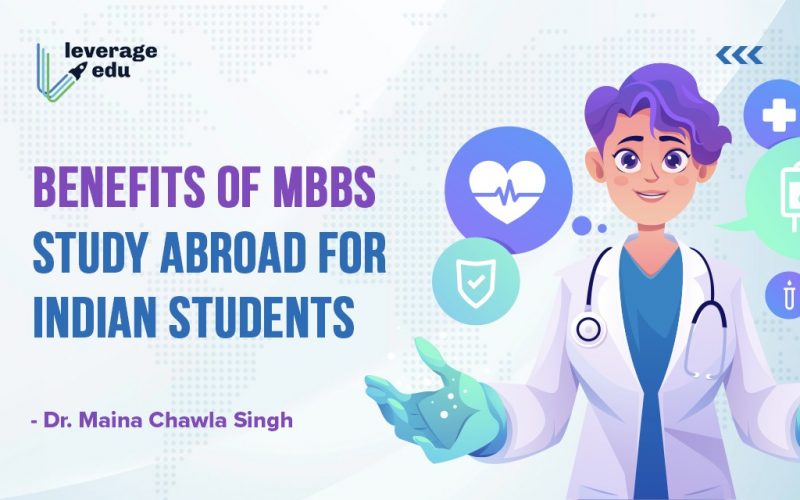Are you considering medicine as a career? Are you anxious about your NEET scores and how your admission to MBBS at a good medical college may be difficult? Have you thought of a Study Abroad option for MBBS? Then this blog has some useful information about the benefits of MBBS study abroad for Indian students!
First, consider these facts:
- India has the largest number of medical colleges in the world –over 595!
- Approximately, 90,000 MBBS students graduate in Modern medicine; 50,000 graduates in AYUSH medical colleges annually in India.
- In 2023 approximately 90,000 seats will be available in Indian medical colleges.
- Yet, thousands of Indian students enrol every year for medical education abroad: in Russia, China, Poland, Turkey and so forth.
So, why is this? What are the benefits of a study abroad MBBS for Indian students? In this blog I will discuss:
- What are the most popular destinations for study abroad in medicine?
- Why are Indian students attracted to go for an MBBS abroad?
- What are the benefits of studying abroad in medicine for Indian students?
- What are some points of caution that you must consider?
This Blog Includes:
Popular Destinations for MBBS Abroad
Students from India study medicine in China, Russia, Germany, Romania, Poland, Ukraine, Georgia, Cyprus, Turkey, Bangladesh, the Philippines, Latvia, and Kyrgyzstan. All of these countries have universities which focus especially on medical education for international students—in English.
Benefits of Study Abroad MBBS
Some benefits of Study Abroad are obvious: It enables a person to become a globally conscious citizen who is professionally aware of research and innovations happening in other parts of the world. This global exposure makes any professional attractive to recruiters, corporates or any organization which is looking out for someone with a well-rounded education. When it comes to studying abroad for MBBS there are some additional benefits:
Also Read: Going to Study Abroad? 6 Life-Changing Benefits to Expect
Eligibility and Easier Admission Process
Securing admission to a medical college in India is tough. Government medical colleges have a lot of pressure and most private medical colleges are too expensive. Admission for MBBS abroad is less complicated and admission is easier. Since 2019, passing the NEET-UG examination is mandatory for Indian students.
But there is no specific application process, and many foreign universities have no entrance examination. Some only require a score of 50% in PCB and English in Grade 12. Other institutions may require a student to pass exams in Biology, Chemistry, Physics etc. In short, check the requirements and apply directly to the university.
Must Read: Culture Shock During Study Abroad and How to Prepare Yourself
Affordable Fees
Compared to private medical colleges in India, some universities in Russia, the Philippines, Latvia and Kyrgyzstan and so forth are more affordable. The cost of living in some of the smaller Eastern European countries is also not so high. Broad estimates suggest that fees vary between INR 15–25 lakhs per year (this may vary).
Education Infrastructure, Lab Facilities, Research
Foreign universities usually have good infrastructure. Studying for a medical degree requires good equipment, and laboratories with the latest technology Indian medical colleges may not have the budgets for such large-scale investment. Medical research may also be more easily accessible within the EU because of better funding.
Practical Medical Expereince
A well-funded medical university can offer students more individual learning experiences. Most are affiliated with big hospitals where students do practical training during the MBBS study. This is important because, after MBBS, a doctor’s professional work is all hands-on. Thus, the practical experience needs to be of top quality.
Degree Recognition
Most MBBS degrees received from the countries mentioned in this Blog are recognized by the Medical Council of India. This means that a qualified MBBS from Poland or Georgia can practice in India.
My Advice as a Career Mentor
Studying abroad is an attractive choice. However, as a professor and a career mentor with many years of teaching at universities in India and abroad, I wish to emphasize that the commitment to study abroad for 3-5 years requires careful thought. The investment of your time and money should go beyond getting a degree. Your education should be intellectually beneficial and socially comfortable. If there are political conflicts or high instances of discrimination or racism that will negatively impact your learning and mental well-being. Here is what you can do:
- Do deep research about the country you plan to study in. What is the political situation? How is the economy doing? What is the cost of living?
- Research the location of the university. Is it a safe area? Does the city have a large international community? Will you be able to manage with English or will language be an obstacle in everyday life?
- Living in non-English speaking countries can be very isolating. Check to see if the campus has a small community of students from South Asia. This is especially helpful in making friends, and building networks of emotional support.
Remember: Do your research carefully when planning your MBBS study abroad. We will be back next Friday with another amazing blog from Dr Maina Chawla Singh. Till then, if you have any questions or suggestions, just drop us a comment and we will get back to you.

 One app for all your study abroad needs
One app for all your study abroad needs






















 45,000+ students trusted us with their dreams. Take the first step today!
45,000+ students trusted us with their dreams. Take the first step today!


